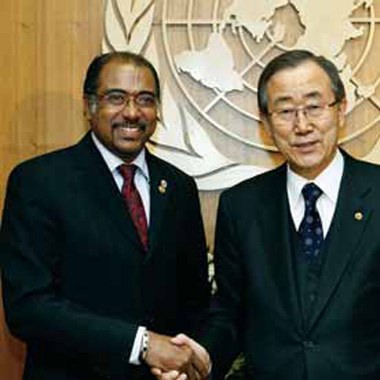
UNAIDS: Preparing for the future
The global economic crisis has heightened the challenges for UNAIDS in ensuring that UN agencies adequately support governments of countries severely affected by HIV, and in holding rich countries to their financial commitments for the effort, according to a co-author of a new report on the agency.
The report argues that Michel Sidibé, the new executive director of the Joint United Nations Programme on HIV/AIDS, will need to focus the organizations work on a few essential tasks. These include promoting evidence-based prevention and treatment strategies, and pressing rich country governments to live up to their pledges, which have been the most visible funding to international development efforts in recent years.
Noting the political difficulties of dealing with a disease that is associated with sexual practices and drug addiction, the report strongly encourages UNAIDS to be a leader in promoting treatment and prevention strategies that are grounded in both scientific evidence and human rights. It also strongly encourages UNAIDS to commit to placing attention on underemphasized parts of the global response to AIDS, especially HIV prevention.
This is a particularly challenging moment for a transition in leadership, said Ruth Levine, vice president of the Center for Global Development (CGD) and co-chair of the working group that prepared the report. With governments distracted by the global economic crisis and having already put unprecedented resources toward addressing HIV/AIDS, Sidibé has to demonstrate that UNAIDS, and the UN agencies that are dealing with the different facets of the problem, are contributing to solutions in very concrete ways.
Sidibé, who reviewed the final report before its public release, said it comes at a critical timejust as we are redoubling our efforts to help countries reach universal access to HIV prevention, treatment, care and support. He added: The report provides valuable insight and independent guidance on how UNAIDS can meet the new realities facing the global response to AIDS, health and development.
According to the report, which was prepared by a 15-person working group of experts in the field of HIV/AIDS and global health, the tasks for which UNAIDS is uniquely positioned include providing a way for groups that are affected by AIDS, who are often on the margins of society, to be heard in international and national-level decision-making; pushing for a more effective response within the UN system; building and disseminating evidence for better policies and programs; and bolstering the capacity for action at the country level.
Tackling HIV/AIDs effectively is a tough challenge which takes political courage and clarity. UNAIDs has a unique role to play in getting governments to rise to that challenge", said working group co-chair Ngaire Woods, director of the Global Economic Governance Programme in the U.K. The recommendations in this report detail how UNAIDs could yet more effectively shine a spotlight on governments, press for evidence-based practices, and underscore a human rights-based approach to the pandemic. (2009)
